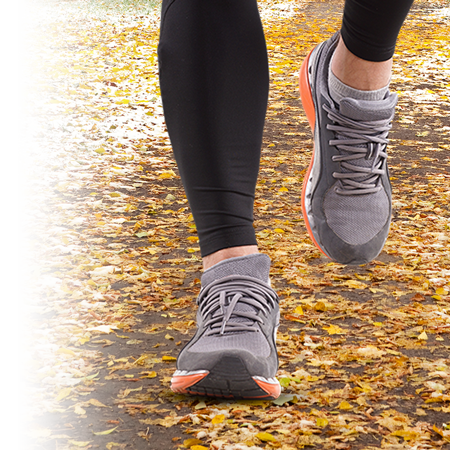For some people, the beginning of the cold season puts an end to physical activity. However, outdoor exercise is a great idea no matter what the season, and it would be a shame if the weather got in the way!
Here's some important information to help you stay active despite the cold.
The benefits of physical activity
There are several well-known benefits to staying active. Here are just a few of them:
- maintaining heart and blood vessel health;
- strengthening bone mass;
- preventing several diseases (e.g. diabetes, high blood pressure, osteoporosis, etc.);
- keeping muscles and joints in good shape;
- better stress management;
- maintaining good mental health;
- overall feeling of well-being;
- more quality sleep.

What’s the ideal temperature for outdoor sports?
Physical activity takes a lot of effort, and outside temperatures that are too hot can have some negative effects. In fact, the hot summer sun can cause heat stroke or dehydration. Fall temperatures, however, offer optimal outdoor conditions to practise a sport because cool temperatures don’t have the inconveniences of heat.
Sure, it's true that cold temperatures can make some people reluctant to go outdoors. But a wide variety of sports are more enjoyable in winter. So, try a sport that’s suitable for you or one you enjoy. After all, having fun is key to maintaining physical activity.
What’s more, beautiful winter landscapes can make outdoor activities extra enjoyable. Hiking in the woods, cross-country skiing, alpine skiing, snowshoeing, skating, and tobogganing are all activities that will help you reconnect with both your inner child and the charms of nature.

The risks related to cold weather
Generally speaking, cold temperatures shouldn't interfere with physical activity. However, it is true that it can sometimes have certain risks, especially for vulnerable people. Here are some examples:
- onset of symptoms in people with a respiratory condition (e.g. asthma or Chronic Obstructive Pulmonary Disease);
- increased risk of angina pectoris or myocardial infarction in predisposed individuals;
- blood vessel constriction that can cause problems for individuals with blood circulation problems (e.g. Raynaud's disease).
Depending on your age, health, and medical history, some particular precautions could apply. Speak to your doctor or your pharmacist if you have any concerns about the impact of cold weather on your health.
Prolonged exposure to the cold can sometimes also lead to complications, like hypothermia and frostbite. Hypothermia occurs when the body loses more heat than it produces, decreasing body temperature. This decrease can potentially affect physical performance and lead to other problems. Symptoms of hypothermia vary from person to person even when they have the same core body temperature. The first symptoms may include, for example, feeling cold, shivering, difficulty speaking, and trembling.
Frostbite is also caused by prolonged exposure to the cold. It consists of skin lesions mostly affecting the fingers, toes, nose, cheeks, and ears, that are caused by a narrowing of blood vessels, which is caused by the cold. It can be unpleasant, painful, and cause itching and it generally resolves on its own, but it can involve complications (blisters, cracks, ulcers, etc.).
How to protect yourself while practising a sport in winter?
To maintain good health while practising a physical activity in winter, you have to dress warmly. But don’t overdress, because it can cause you to sweat a lot, which in turn can make your body feel cold. Anyone who’s ever felt like they were freezing in their wet clothes knows exactly what we mean! So, plan ahead and estimate the number of layers of clothing you'll need, depending on the temperature outside.
Indoor physical activity: a good choice in winter!
If you don't like the cold, why not exercise indoors in the warmth and comfort of a heated room! Great indoor activities for winter include:
- dance;
- exercise bicycle;
- swimming;
- rock climbing;
- gym workout;
- racket sports;
- team sports (e.g. ball hockey, broomball, volleyball, basketball, etc.).
Keep moving, even when it’s cold
The changing of the seasons shouldn't dampen your enthusiasm for the sports you love. All you need to have fun is the right clothing and a little motivation, even in fall and winter. So, put on that tuque, slip on your gloves and face the cold with enthusiasm!


